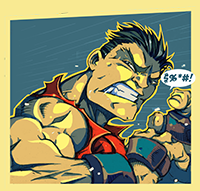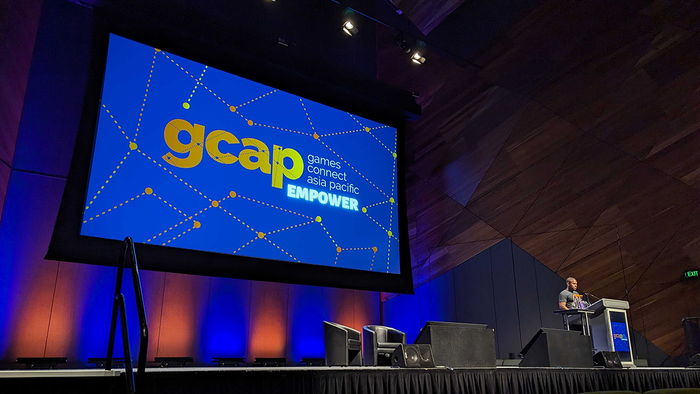
Featured Blog | This community-written post highlights the best of what the game industry has to offer. Read more like it on the Game Developer Blogs.
Creature in the Well Development with Bohdon Sayre
Bohdon Sayre (or Bo) is the programmer for Creature in the Well, a game that has recently been released and has been coined by fans as a pinball hack and slash adventure game.

(This is an interview conducted on the Game Dev Unchained podcast)
Bohdon Sayre (or Bo) is the programmer for Creature in the Well, a game that has recently been released and has been coined by fans as a pinball hack and slash adventure game. In this interview Bo shares the team's success of having a smooth development cycle that was planned and released after one and a half years of work. We also cover how Flight Studio teamed up with a great marketing firm (https://popagenda.co/) that removed many of the variables for a major first indie game release.
Introduction
My name is Bohdan Sayre, and I'm a developer up in Montreal. We're part of a team called Flight School Studio and we just recently put out a game called Creature in the Well. It’s currently out on Steam, Nintendo Switch, and Xbox and that's been our focus for the last year and a half.
What is Flight School Studio and the team’s approaches to efficiency?
Flight School Studio is a commercial studio so we're used to working on pretty small projects or bite size ones for a couple of months. Some projects are obviously longer or shorter. But when we started Creature in the Well, the pitch was, we want to run a medium-sized production and keep the team lean. We planned to go for about a year and a half as the goal. So we knew that up front as we were designing it and were scoping everything we wanted to do. The team have always been production-oriented in that way. So that's definitely been kind of like a goal of ours to do things a little bit quicker, a little bit more efficiently, to see what we could get out there in a shorter amount of time.
About the Core Team
The core team on this project is on the smaller side. It was just two people: myself, and another developer Adam Volker. However, what's cool is that we get to leverage people from other projects, here at Flight School Studios. So it's definitely not like a two-person job because we got to borrow some modeling and animation time. Which helped us out greatly. I think an average project of Flight School Studios was probably around five people. We've done projects that have like ten to fifteen people on them for certain periods of time. Things will ramp up or down depending on the type of project or the client or things like that. Creature in the Well was on the smaller team size and having a longer schedule worked for us.
Avoiding Feature Creep and Keeping within Scope
When we start with that type of boundary or guideline I think, to us, it creates interesting challenges and problems to solve. Where we get to think creatively about how we do something and not be weighed down on something that may be way out of scope. We took that in mind when we started designing everything from how we were gonna create assets and build levels and all of that stuff. That kind of just seeps its way into each of the little micro decisions you make along the way about how we're gonna accomplish this or get it done given the constraints. I think there's a lot of areas in which you don't have to limit yourself. Under that type of guideline I wouldn't say that we really felt that restricted along the way.
Knowledge and Familiarity Advantage
Adam and I have been working together for a very long time for almost 10 years. So we have a really good understanding of how to work with each other and how to figure stuff out. The people that are also a part of Flight School Studios are those that we've known or had worked with for a long time before the studio existed. There's plenty of knowledge and familiarity between the team so we had a unique advantage that we were able to pitch something and get approval quickly. We had the trust to go heads down and work on this thing. We’re also allowed to to push into a little bit of a new media and new area for Flight School.
Creature in the Well Unique Genre Mesh
At the beginning of last year when we started the prototype and kind of had the one-liner ideas I was playing a lot of Rocket League and that mobile game Balls. We wanted to make an adventure game and had a bunch of other inspirations that we both loved and wanted to work it into Creature in the Well. So I think at the time we just came up with a real simple, Zelda, but you're playing top-down air-hockey with the ball that bounces around and it's all two-dimensional. Once we started to prototype that it really evolve into something more puzzly and single-player based. We added bumpers and what I would call breakout bricks that you would like to hide and they would explode or would react in that way.
Pinball wasn't one of the first inspirations, ironically, but once we started getting farther down the road we realized the game was a lot like pinball. We started to use that term to help explain it to people to avoid long conversations of what the heck the game is. I think that's one of the most common pitfalls of indie games is the inability to communicate directly.
Show Don’t Tell
There’s definitely a balance between documentation and getting things in engine. I'd document as much as possible, but in my mind, I also try to avoid writing documentation that I feel is just a guess or it can't be proven yet. We would sit down and write down a bunch of ideas and then I'll go through that list and try them out. As you try them it out in the engine, you're not in documentation anymore for a good amount of time and the design will just evolve rapidly. So things can get pretty far away from where the documentation usually is, especially early in the production. We tend to have specific checkpoints where we ask ourselves critical questions like what are the worst parts about this thing right now? We would list them out and be really explicit about it and then take the time to document that. I believe it's a balance and if not careful, teams can over document and or spend too much time in engine and not necessarily have a good bird's-eye view of where the game is at.
Marketing First Indie Title
Our marketing team is amazing. Popagenda handled all of the marketing for us. They’re a powerhouse team of three, now four actually, and they guided us fully through the process. When they jumped on board we were upfront about how we have never launched a game of this scale and we've never really launched a game in the indie game market either, in which they were incredibly familiar with. We were pretty invisible in that market to start with so they immediately helped us get on track. An example was that we wanted to announce the game much sooner than we did and the folks at Popagenda said ‘No, no, no. You need to wait until you have these things. Wait until you have these assets.’ So they helped us to lineup with all these dates and got us to work along with marketing beats and all that stuff. I can't say that I even understand all of what they did because it was just really well done. But it was awesome to work with them and we definitely learned a lot going through that journey.
Previous Versatile Experience Leading to Unique Game Design and Distinction
When I say I used to work at a company that was in the film and animation background I'm referring to a company I used to work for called Moonbot Studio. It started as a short film studio and our goal was to make films and cool animations. So we created a project called Fantastic Flying Books of Morris Lessmore which was a mix of fully animated and actual miniatures. Miniature backgrounds where there was physically built sets that were photographed and then composited into the CG animation which won an Oscar. We won an Academy Award for the best animated short film of that year, 2012.
Furthermore, I think the iPad was coming out or some cool Apple hardware and we wanted to get into that. This was a small company and we wanted to explore the experimental technology. So we organically started this interactive division of Moonbots Studio which Adam and I were heading up. That's where we started getting more and more into interactive media. We worked with children's books, different mobile experiences, just like music videos or things you would see in the early app store days.
Adam and I worked on a project that never got released because of legal IP mumbo-jumbo that's not worth talking about but we worked on a game for a couple of years and learned a lot because we were actually working with Sony Santa Monica at the time. The team that I worked with that shipped Journey game is in the same building as the God of War team. We were learning a lot along the way as we kind of evolved from this pseudo mobile developer to console developer. All this experimentation helped Adam and I culminate a variety of projects which helped us with future projects.
Shout Outs and Special Thanks
I'm definitely going to shout-out to PopaGenda and their amazing team: Jen, Nikki, and MC. Plus all of the games they are representing right now. I wanted to say a big thanks to all of our testers as well. When we talk about the game we express it’s a core team of two, but I feel it doesn't do it justice because so many people influence a product along the way. From family to friends and everyone that's even around. I've just learned that everybody should be more vocal and supportive of each other as they go through development. It's really interesting being on the side of development where you've got a product and you're trying to put it out there and all you want is people to notice it or talk about it. But then this shift in mentality happens where I should do that for all the games that I love. I feel there's so much we could do to help each other as indie developers. It isn’t easy to survive in the industry and I feel we've been incredibly lucky in a lot of ways so I'm just trying to do what I can to help out other developers.
[this is a repost from www.gamedevunchained.com- the original article can be found here with resources and links]
Read more about:
Featured BlogsAbout the Author(s)
You May Also Like







